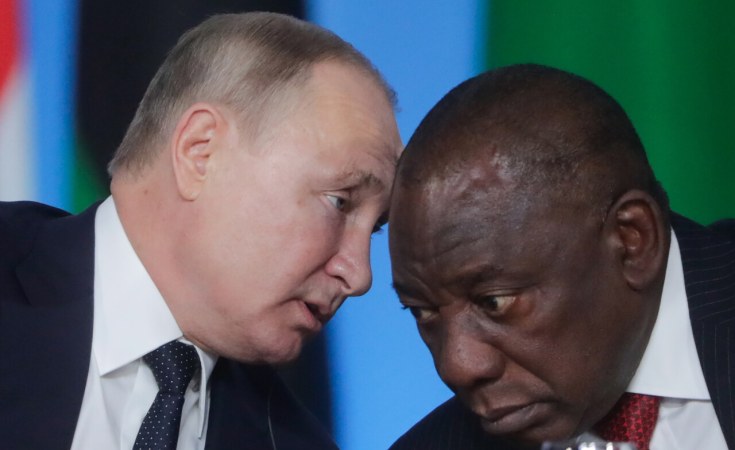London — Russian President Vladimir Putin has denied he is seeking to oust Western influence in Africa, as new analysis suggests the Kremlin's military intelligence arm has taken over activities of the disbanded Wagner Russian paramilitary group on the continent.
In a television interview broadcast in Russia on March 13, Putin dismissed claims that Moscow is seeking to displace France as the major partner of countries such as Mali, Niger and Burkina Faso.
"We have not ousted anyone. It's just that the African leaders of certain countries made agreements with Russian economic operators, wanted to work with them and did not want to work in certain areas with the French. It wasn't even our initiative, it was an initiative of our African friends," Putin said.
"We are not instigating anyone and do not seek to turn anyone against France. To be honest, overall, we do not have national tasks at the Russian state level there. We're just being friends with them, that's all," the Russian president added.
'Regime survival package'
In the past decade, analysts say Moscow has sought to extend its influence in Africa through the deployment of Russian forces -- often under the guise of paramilitary fighters -- and arms deals with African governments, in return for access to resources.
A recent analysis by Britain's Royal United Services Institute (RUSI) suggests that Russia has rebranded the former Wagner paramilitary group as an expeditionary corps which is now under the control of Moscow's military intelligence arm -- known as the GRU -- and is offering what it calls a "regime survival package" to autocratic governments in Africa.
"At a time when many Western states were trying to economically isolate Russia following the full-scale invasion of Ukraine, Putin saw the development of economic ties with Africa and the Middle East as a means to sanction-proof Russia, and he had a pitch for the leaders of these states," the report said.
"It centered on the proposition that the 'international rules-based order' advocated for by the West structurally favored Western interests, whereas Russia's emphasis on sovereignty would offer a mutually beneficial partnership. The reality -- as Russian officials acknowledged internally -- was a renewed Russian colonialism," the RUSI report added.
Wagner rebranded
Wagner fighters have been deployed in several African countries, including Libya, Sudan, Central African Republic, Niger, Burkina Faso and Mali. They have frequently been accused of committing widespread human rights abuses.
In June 2023, as Russia's invasion of Ukraine was struggling to make progress, Wagner's chief, Yevgeny Prigozhin, led a failed mutiny against Moscow, accusing the defense ministry of depriving his fighters of ammunition. Wagner was disbanded shortly afterward. Two months later, Prigozhin died in a suspicious plane crash.
That left a dilemma for the Kremlin: What to do about Wagner's operations in Africa?
"After that so-called mutiny, the decision was made that it would be better to have it more in-house rather than outsourced," said Oleksandr Danylyuk, an associate fellow at RUSI and a co-author of the report.
The analysis shows that Moscow has rebranded the Wagner group as the expeditionary corps of the GRU, Russia's military intelligence agency, with a target of recruiting a further 40,000 troops to serve in the force. Its aim is to secure Russian interests overseas -- including access to resources such as oil, gas and minerals -- while also reducing Moscow's vulnerability to Western sanctions.
Russia colonialism
"What they're doing is just expanding colonialism in the Global South countries. And right now they are very much focused on African countries, but they have plans for Latin America as well, some Asian countries. They will also have political technologists, media experts, intelligence officers who are specialized in political warfare, economic operations. So, pretty much everything to be able not only to infiltrate those Global South countries, but also to establish pro-Russian regimes there," Danylyuk told VOA.
The RUSI report says Russia helped to foment military coups in parts of Africa and is now seeking to displace Western influence.
Mali
France and other European nations sent troops to Mali in 2013 to help fight an Islamist insurgency. They were withdrawn in 2022 after successive military coups and a breakdown in relations between Paris and Bamako. A 12,000-person United Nations peacekeeping force also pulled out last year at the request of the junta government.
Several hundred Russian-backed fighters are now in Mali supporting the military junta under interim President Colonel Assimi Goita. Moscow also has backed military governments in Niger and Burkina Faso, and is supporting General Khalifa Haftar in Libya against the unity government under Prime Minister Abdul Hamid Dbeibeh.
'Plausible deniability'
The pretense that Wagner was a private army separate from the Kremlin allowed Russia to deny involvement in its Africa operations. "Many of the operations being conducted were either at the expense of other states or violated U.N. Security Council resolutions," according to the RUSI report.
"The problem for the Expeditionary Corps is that it risks the removal of this plausible deniability... It appears that Russia has finally decided to explicitly challenge the international system rather than pretend to comply with it."
Western challenge
The authors of the report warn that Russia's expansion of operations in Africa could have serious consequences for Europe and the West.
"Through persistent instability, Russia can push migration into Europe, creating the conditions... to pursue political destabilization," the report warns. "Leverage over natural resources is also expanding. Perhaps most problematic, however, is how the pitch for values is giving Russia access to communities that interface with a range of extremist beliefs."


